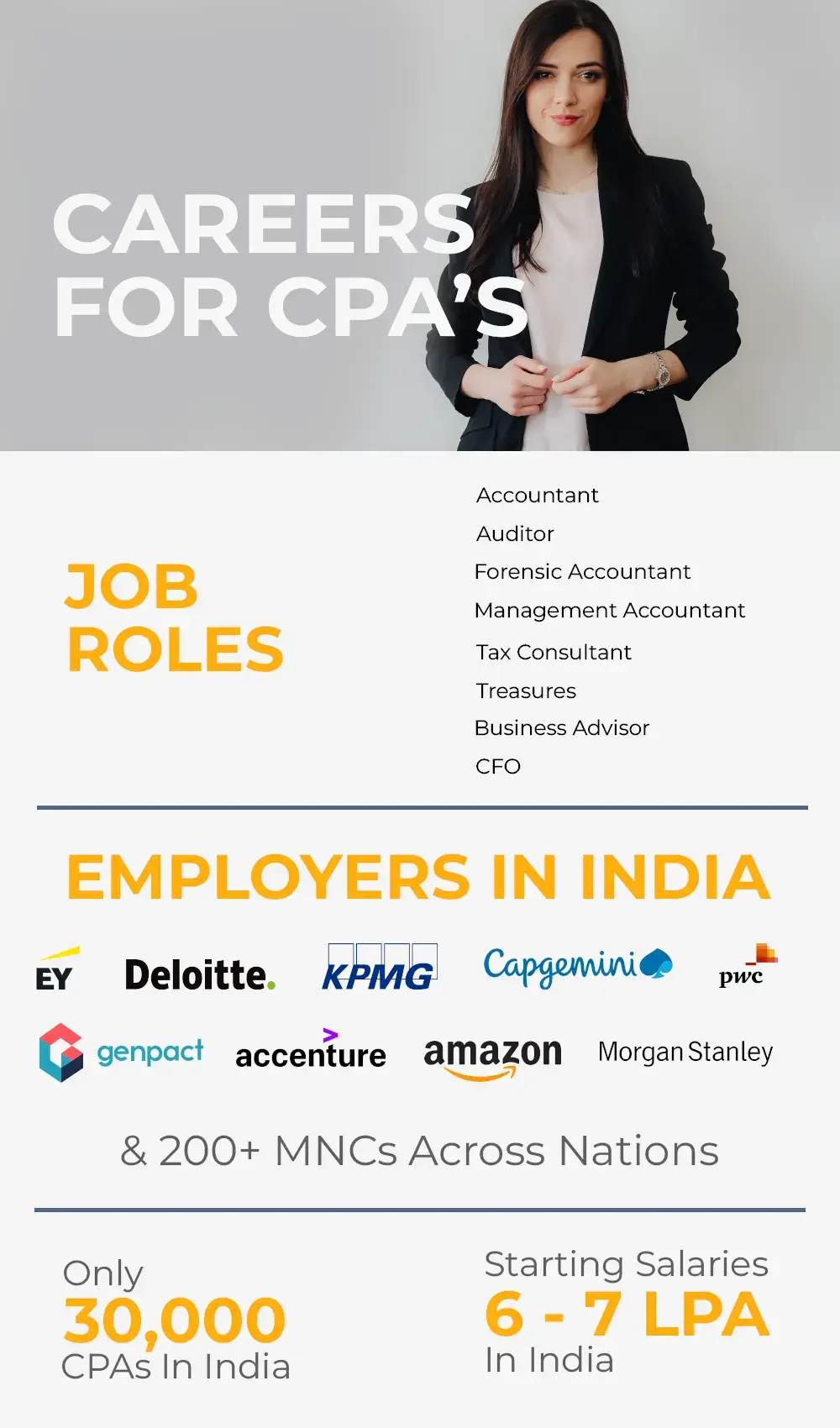What is CPA?
US CPA – Certified Public Accountant is the title equivalent to an Indian CA (Chartered Accountant). Although predominantly pursued in the US, It has a worldwide acceptance and provides a strong foundation to students and professionals for careers in Accounting, Assurance, Tax Consulting, Business Consulting and Valuations.
Today, let’s discuss all about US CPA, course structure, syllabus, exam requirements and patterns, career options post CPA, how to pursue CPA and other related details.
What Is A CPA? (Certified Public Accountant)
CPA, which stands for Certified Public Accountant, is a professional accounting qualification acknowledged globally and provided by The American Institute of Certified Public Accountants (AICPA). US CPA is one of the most sought-after qualifications which is globally recognized, well reputed and has over 670,000 actively licensed members as per NASBA (National Association of State Boards of Accountancy).
CPA professionals gain in-depth knowledge of various accounting principles and tools required for the financial management of small to mid to large corporations. CPAs usually are responsible for providing financial advice, auditing, taxation, and other services related to financial matters.
Another crucial aspect of CPA that you must know about is Generally Accepted Accounting Principles, commonly known as GAAP. With time and evolving businesses, auditing has become more important than ever before. Auditing standards have significantly evolved and new principles are introduced to maintain consistency and uniformity in audit performances.
These principles are established by The American Institute of Certified Public Accountants (AICPA) and are usually referred to as GAAP. They are a set of rules and standards which advises CPAs on how to record and report financial information. The CPAs must adhere to the GAAP principles while performing audits of financial statements to generate standardized results.
6 Reasons Why You Should Become A CPA?
Career Options For CPAs
How Can You Become A CPA?
1. Check If You’re Eligible For CPA
As per AICPA Guidelines, students need 120 Credits to sit for the CPA exam and 150 Credits to get the CPA License. Although, this changes a bit from US state to state.
Of the 120 credits, you need to have 24 Credits in Accounting & 24 Credits in Business respectively. Just so you know, In India, each year of your college corresponds to 30 credits.
Now let’s see if you are eligible or not?
- If you are someone with a bachelor’s degree in any commerce field (e.g. B.Com/BBA/BAF etc) from a NAAC – A college, you are eligible as your 120 Credits would be fulfilled in this case. Therefore, you can sit for the CPA exam, but you’ll still need to complete the shortfall of 30 credits
- If you’re a commerce bachelor from Non-NAAC college, you need to do a 1-year bridge course which will give you those extra credits to sit for the exam. To be eligible for the license, you’ll need to do a 2-year bridge course from a reputed institute.
- For non-commerce candidates, for e.g. engineering candidates, your 120 Credits would be fulfilled in the 4 year course, but you would be missing the 24 Credits each in Business & Accounting. Hence, in this case you need to complete the shortfall by pursuing any 2-year course in Business & Accounting.
- In case you have a Master’s degreeg. MBA, M.Fin, M.Com, your 120 Credits requirement would be fulfilled, but you need to check if your Accounts & Business Credits requirement is fulfilled or not. Take up a bridge course accordingly to be eligible for the CPA License.
- A Professional Charter Holder such as a CA/CS/CMA is eligible to take the CPA exam as well as apply for the License.
2. Understand The CPA Course Structure
The CPA Curriculum is divided into core subjects & disciplines. The core subjects include –
- Auditing and Attestation: Covers Statements of Audit Standards
- Professional Responsibilities and ethics
- Planning and supervision
- Internal controls
- Corroborative Audit evidence
- Audit sampling
- Audit reports
- Other Auditing and attestation topics
- Financial Accounting and reporting: Covers US GAAP and IFRS
- Conceptual framework, financial reporting and miscellaneous topics
- Current assets and liabilities
- Investments, PPE and Intangibles
- Bonds, Leases and Pensions
- Deferred Tax, EPS, Equity and Cash Flows
- Consolidation, Foreign currency, Partnerships and NPOs
- Governmental accounting
- Regulation: Covers US federal taxation
- Taxation of Individuals
- Property transactions and depreciation
- Taxation of C-Corporations
- Taxation of other entities
- Supplementary taxation topics
- Statutory Reg & Business structures
- Business law
As per the new CPA Evolution Initiative by the AICPA & NASBA, here’s the list of disciplines coming into effect from October 2023.
- Business Analysis & Reporting (BAR) –
- Assurance or advisory services,
- Financial statement analysis & reporting,
- Technical accounting
- Financial and operations management.
- Information & Systems Controls (ISC) –
- Business Processes,
- Information systems,
- Information security and governance
- IT audit
- Tax Compliance & Planning (TCP) –
- Individual Tax Compliance & Planning
- Personal Finance Planning
- Entity Tax Compliance and Planning
The course has been structured keeping in mind that accountants today have a very challenging role in organizations and need to keep up with technology & contribute to increasingly complex projects.
Getting you placed is our commitment. At Proschool you are assured at least 3 Job shortlists within 6 months of course completion
3. Know About The CPA Exams
The CPA exam is divided into 4 section and stretches up-to 16 hours. 3 sections are – AUD, FAR & REG. You need to have master any 1 of the 3 primary disciplines (BAR, ISC, TCP) which will become your 4th section.
Earlier, you had to complete your 4 CPA exams in 18-months period. Now, according to the CPA Evolution, you have 30 months to complete the exams. This means that you now get additional 1 year to clear your CPA exams.
The format of the CPA exam is 50% MCQs and 50% Test-based Simulations (TBS) & you can take the exams in any order. Just for ISC, the weightage changes to 60% MCQs & 40% TBS. The discipline you choose will in no way effect your CPA License in a negative manner.
You need to score a minimum of 75/99 to pass a section. In case you fail a section, you’ll receive a CPR (Candidate Performance Report) which’ll give you an idea about where you need to focus.
Also Read – What is CPA License & can A CPA practice in India?
4. When & Where Can You Give Your CPA Exams?
You can take the CPA exams any time of the year and Since January 2021, there are 8 testing centres in India where you can take the exam –
- Mumbai
- Ahmedabad
- Bangalore
- Calcutta
- Chennai
- Hyderabad
- New Delhi
- Trivandrum
5.How To Prepare For CPA?
Clearing the CPA exam requires extensive hard work and comprehension of all the necessary concepts of finance. One easy way that can help accelerate and make your preparation for the CPA exam effective is enrolling on a CPA course from IMS Proschool.
Here’s what you get when you enroll with IMS Proschool –
- Best in class content
- Learn from accounting ninjas with 25+ years of experience
- Get personalized assistance for CPA eligibility & application process
- Opt for additional AICTE approved credit programs
- Get a gateway to Big 10 consulting firms
Also Read – A List of Changes in the US CPA Exam 2024
6. Steps To Become A CPA In India
Step 1 – ACADEMIC EVALUATION – Check academic requirements and make sure you are eligible to give the exam which depends from state to state.
STEP 2: APPLICATION TO TAKE THE EXAM – Post evaluation, fill out the necessary forms and submit your application
STEP 3: STUDY FOR THE EXAM – Create a study plan and study section-wise/ multiple sections together.
STEP 4: SCHEDULE THE EXAM – Receive an NTS (Notice to schedule) and schedule an exam at your chosen location well in advance.
STEP 5: TAKE THE EXAM – Take the exam on the notified date and complete all sections within 18 months of clearing the first section.
STEP 6: OBTAIN WORK EXPERIENCE – Most states require certain years of work experience (2 years in most cases) along with 150 Credits to obtain licensure.
STEP 7: OBTAIN LICENSURE – Apply for licensure within 3 years of passing all 4 sections and possessing the required work experience.
STEP 8: CPE TO MAINTAIN LICENSURE – Continuous professional education is required to maintain the CPA License which varies from state to state.
FAQ’s
Need More Info? Read Our Latest Blogs
Explore, Share And Enjoy Our Curated Content
Investment banking is historically an interesting and lucrative profession. It is a critical part of the economy that allows companies to raise money, manage investments, [...]
Investment banking is one of the most important areas of finance. It helps businesses raise capital, make big financial decisions, and navigate complicated transactions. Investment [...]
Giving customers advice and analysis on stocks, bonds, and other financial instruments is how investment banking and equity research contribute significantly to the capital markets. [...]





